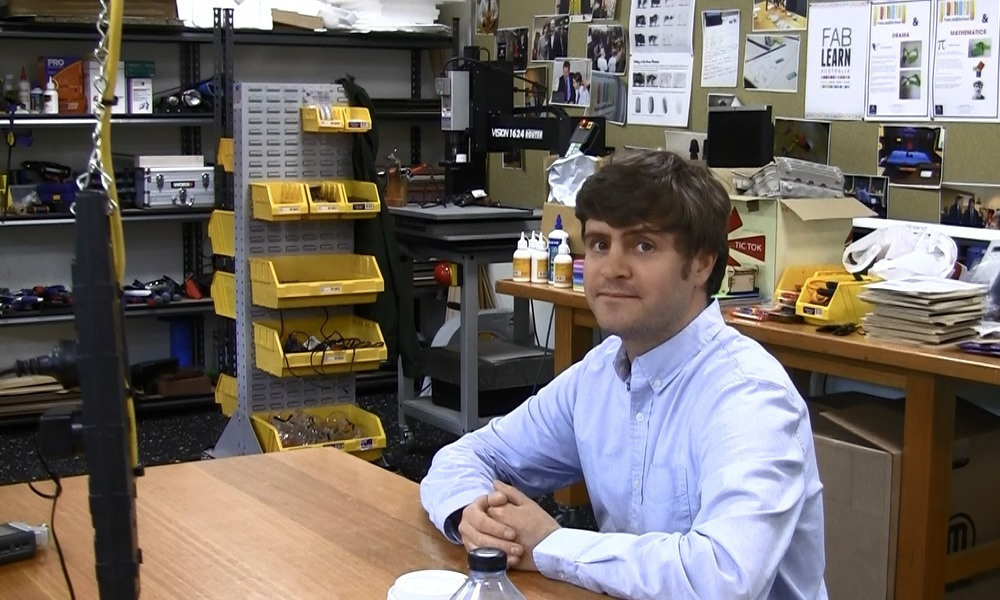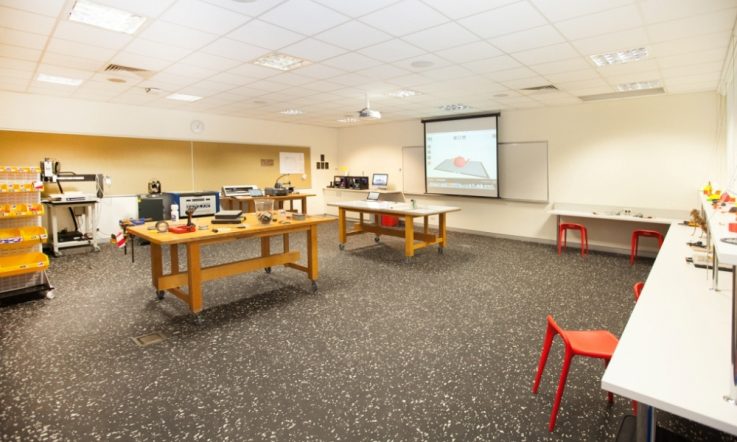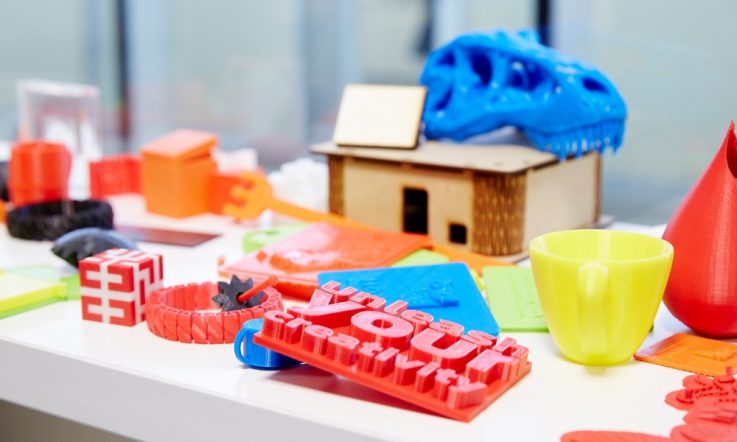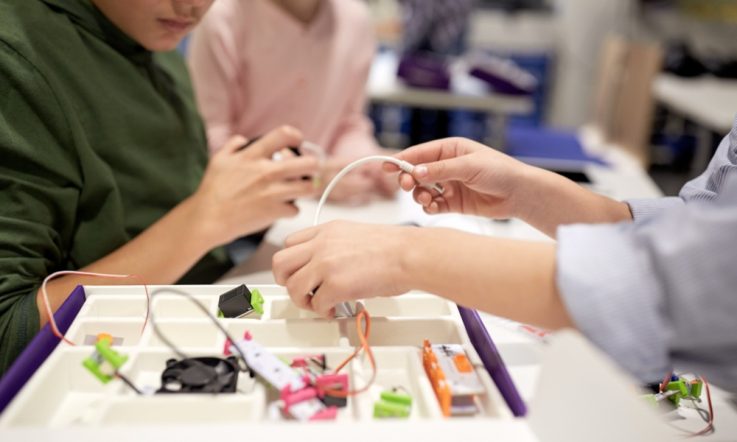Hello, you're listening to an episode of the Global Education podcast series, from Teacher magazine.
I'm Jo Earp and my guest today is Jaymes Dec, IT Integrator at The Marymount School of New York in Manhattan. For the last seven years, he's been teaching computer programming, physical computing, digital design and fabrication in FabLabs and makerspaces. He's also co-founded the NYC Makery – a public makerspace where children, families and educators can experiment and explore. And he's President of the Nerdy Derby.
Jo Earp: Jaymes Dec, thanks for joining Teacher today. So, to start off can you explain a little bit about the makerspace work that you're doing at Marymount?
Jaymes Dec: So, Marymount is a [p-12 school]; we have about 750 students but they're distributed across three different campuses. So, we actually have three separate makerspaces at the school. I work in the FabLab, which is in the middle school. I work primarily with [Grade 6-8] students and they actually have a class that all the students take – a mandatory class, part of the curriculum – it's called a Technology class and it sort of takes the place of their old ‘computer skills' class.
In this class, students do a series of projects to learn how to use the tools in the FabLab and then, sort of as quickly as possible, we try and get them to come up with their own ideas and start working on projects that they're really interested in. Along with that, we also do quite a bit of integration with classes like science and with art; we really like to combine classes and do projects that are multidisciplinary – mostly with science, math and art.
JE: You're in Australia this week working with Lauriston Girls' School, but is the situation in the US, would you say you're further ahead of where Australia is in this kind of space?
JD: Both Australia and the US are big, big places so I think that there are pockets that are ahead and pockets that maybe are just starting to catch on. I have noticed that there's a lot of interest in Australia right now in this type of stuff. I think in the US, in the east coast we're really just sort of starting – Marymount was the first private school to start a FabLab in America, and that was only five years ago. If you go to the west coast and California you'll find a lot more really well established programs, not necessarily FabLabs but places that have had makerspaces.
I mean, this stuff is not new, right? We had shop classes in the 1980s … to some extent home economics and classes like this existed for decades and it was really in the 1980s and 1990s when those classes were shut down (for whatever reasons – budgetary, safety …) but I think as digital fabrication tools have become more accessible and less expensive and easier to use, we're finding more and more schools are starting spaces like this.
But I am aware of, I have some friends, people like Gary Stager who actually comes here quite a bit and does workshops around similar ideas. So, I know that there's a lot of interest here.
JE: A few years ago now, 2013, you co-founded a public makerspace and that's called the NYC Makery. That's a pop-up space isn't it? And, what you're looking to do is extend that for teachers as well – what's happening with that, making it a permanent fixture if you like?
JD: There's a few reasons that we opened this space. The main reason is The Marymount School, a lot like Lauriston, is really a school for privileged students, students that can afford a private education. One of the concerns that we have is that these spaces like FabLabs and makerspaces are opening up in a lot of private schools in America but not so much in public schools. So, it really does exacerbate this access gap between the ‘haves' and the ‘have-nots'.
So, we opened The Makery really as a response to that – we want to give all kids access to these tools, not just kids that can afford it. Really, part of the Charter of the FabLab network is to provide public access to these tools, so really The Makery is a space that we opened in response to that idea. We fund it partly through paid workshops but then we try to have public open hours.
And actually, we originally were a pop-up space, but recently within the last couple of months we did secure a permanent location. So now we have a full-time open storefront in a neighbourhood called Gowanus in Brooklyn.
JE: Fantastic – and that's open to educators as well is it?
JD: Yeah, a big part of our mission is teaching teachers to use these tools, so we have workshops for teachers, we try actually to do those workshops for free too – if we have a workshop that's open to the public, if you're a teacher you can participate for free.
JE: Great, so, if any Australian educators find themselves in New York, they can drop by the permanent space you've got. Now you're also – it seems to me you've got a fairly busy life! – you're also President of the Nerdy Derby. Can you explain what that is and how that's involving schools?
JD: Yes! So, the Nerdy Derby, it really started as a project at my grad school, where I studied interactive technology at NYU, it was actually started by some students after I had graduated. They designed this race car track – it's about three metres high and 15 metres long; it's got three tracks.
They built it for a Maker Faire – the World Maker Faire in New York City, back in 2012. The idea is that they would have this exhibit where kids would design cars to race down the track. It was a really big project to build this thing and it was such a big hit at the festival – it won many awards and so when I saw it there I asked the kids who had designed the track ‘could we set this up at my school?'.
We set it up in the cafeteria one week, we cancelled classes for a whole week – the kids just did a series of experiments to figure out what are the variables that affect the speed of a vehicle on this track and then we had this big derby at the end of the week. We had competitions for the fastest car but also the slowest car that can finish the course. And there's a hill in the middle of the course so we have the ‘Queen of the Hill' competition as well (the car that can stop at the top of the hill most consistently).
After the success of that in-school event we decided to turn the Nerdy Derby into a non-profit. I joined the board and really now we set up the track at schools, at museums, at festivals and art galleries, all sorts of places. But also a big part of it is we have this open-source mission – so, we publish the plans for the track online and we encourage people around the world to build this track.
We've had pictures and videos from people as far away as Thailand, South America, Europe; really people are building the track all over the world and hosting their own derbies.
JE: Fantastic, so again if people in Australia want to get involved schools can just head to your site there – we'll put the links in for people to follow. Finally then, before you go, I saw that in 2013 you were named a ‘Teacher of the Future' by the National Association of Independent Schools. So, I'm interested in your views of what you think a teacher will look like in 20 years – what your hopes are for teaching.
JD: I really hope that school moves away from siloed subjects, from having separate History, English, Math classes; I really think that that's not how the world works. I see the future of schools as having a lot more interdisciplinary projects, collaborations between different classes. The role of the teacher has become less somebody that's presenting information, more a coach and helping students discover things. I think that doing hands-on projects is a really great way to help kids construct their own knowledge.
So, I really do see the future of a teacher as more like a coach than the traditional ‘teacher' and really somebody who can help kids discover information that probably the teacher might not even know themselves.
JE: That's looking into the future – for now though, enjoy your time in Australia. Jaymes Dec, thank you very much for joining Teacher magazine.
JD: Thank you.
That's all for this episode of Global Education. To download all of our podcasts for free, visit acer.ac/teacheritunes or www.soundcloud.com/teacher-acer. To access the latest articles, videos and infographics visit www.teachermagazine.com.au.
Schools around the world can stage their own Nerdy Derby. For resources and details of how to get involved and to request open-source plans so you can build the track in your school, visit www.nerdyderby.com
The NYC Makery is a public makerspace which also runs workshops for teachers. To find out more, visit www.nycmakery.com



